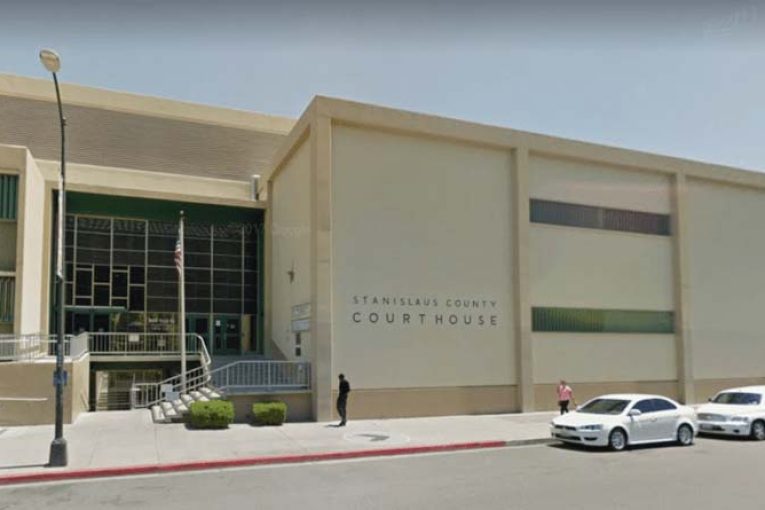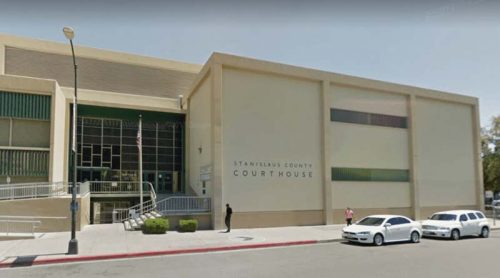

By Cheyenne Galloway
MODESTO, CA – Stanislaus County Superior Court Judge Dawna Reeves last week reduced the accused’s charge from a felony to a misdemeanor in an alleged assault case after hearing testimonies from two witnesses and the arguments presented by Deputy District Attorney James Howard Langston and Deputy Public Defender Amy Elizabeth Kennedy.
Ruling there were inconsistencies between the alleged victim’s report and witness testimony, the judge contended she could not charge, even as a misdemeanor, the punishment for an act resulting in significant bodily injury or death, citing the victim’s demeanor and odd behavior.
PD Kennedy said the damages claimed by the alleged were delusions and misconceptions.
“There was no criminal threat made on that day. There was no incident involving a backpack; there was an argument over money, but nothing criminal occurred. Regarding this previous incident that the victim claims she reported to the Modesto Police Department. She did not. Officer Ureno did his due diligence to find that prior report; there was nothing there,” said DPD Kennedy.
But, DDA Langston contended the defense read into and formed conclusions on the victim based on the medical diagnosis and the victim’s current Penal Code section 1,001.36 diversion petition proceedings involving her mental health.
“I think the defense counsel is reading into the medical diagnosis further than what was presented in the evidence today. We had to mention the medical history of anxiety and paranoia, but there is no actual diagnosis document that has been admitted in evidence,” said DDA Langston.
DDA Langston added that looking at the factors in isolation creates a compelling narrative for the defense, inferring the victim made everything up in her head due to her history of mental illness. He believed it may be harder to understand the entirety of the case’s nature since the events are not clearly and accurately pictured for the court.
“We do have the victim, who did get transported to the hospital, and there was a medical exam showing that there was something on her head portraying tenderness, and she was emotionally distraught when she spoke to Officer Ureno,” said DDA Langston
DDA Langston then pointed to witness testimony in the apartment during the incident. He explained it is unclear how long she was there since she testified to leaving at some point.
The witness admitted to hearing the argument between the accused and the victim, which further corroborated the victim’s statement, according to DDA Langston in his argument.
On October 5, at approximately 4:31 p.m., Officer Brandon Ureno was dispatched to an apartment following a reported fight, according to his testimony in court. The reporting party told Officer Ureno that his neighbor, the alleged victim in the case, ran over and hid inside a closet in his residence.
Officer Ureno testified in direct examination with DDA Langston that he could not see the victim in the hallway upon entering the man’s apartment. Not until he announced his presence several times as Modesto County police did the alleged victim exit the closet into the hallway.
In the cross-examination by PD Kennedy, Officer Ureno explained this behavior as unusual for someone seeking police assistance, noting, “They are more than willing to come talk to the police. It is uncommon for victims or reporting parties not to contact the police after an emergency like this.”
As he began talking to her, the officer testified the alleged victim began shaking and crying, recounting going to the bank with her caseworker to withdraw $120 and returned to her apartment, securing the $120 in a “ceramic piano.”
The alleged victim then told Officer Ureno the accused, her boyfriend’s friend, retrieved the $120 and told her that there should have been more money. As a result, she said the accused hit the victim approximately four to five times on her head with a backpack, threatening to kill her.
In cross-examination, Officer Ureno admitted that, while describing the assault, the victim never said the size, weight, location, or possible items that could have been inside the backpack, adding he did not recall seeing the alleged backpack after searching the apartment, where the accused was no longer to be found.
In addition, Officer Ureno did not locate a ceramic piano while searching her apartment. Nor did he notice any visible injuries on the victim’s head.
After the attack, the alleged victim ran to her neighbor’s apartment, which is less than a half block from the apartment where the incident took place. Later in her interview with Officer Ureno, she divulged another incident with the accused that occurred roughly two to three weeks before Oct. 5.
Officer Ureno confirmed she also informed him that she reported a prior incident with the accused in September to law enforcement, and she explicitly talked to Modesto Police Dept. officers.
Sometime between Sept. 14 and Sept. 21, the alleged victim reported watching the accused’s son and left the residence without informing the accused; in turn, the accused angrily asked why she had his son and used his right hand to strike the victim in the face, knocking out her tooth, according to the officer’s testimony.
Officer Ureno agreed the alleged victim had a missing bottom tooth.
Later in the cross-examination, it was revealed that Officer Ureno could not pinpoint any record of this prior incident described by the victim in the Modesto Police Department databases.
Furthermore, since Officer Ureno was never in contact with the victim before Oct. 5, it is unknown whether the missing tooth is from the prior alleged incident in September or a different time, noted the court.
Judge Reeves then proceeded to ask Officer Ureno questions concerning the victim’s state of consciousness. He stated she did not appear to be under the influence, but he added she did seem to be experiencing an emotional disturbance, including an elevated heartbeat and shaky disposition, which can be relevant to some stimulants.
Officer Ureno testified he did not see her caseworker or any visual evidence to indicate a visit to the ATM, such as a receipt, while on scene.
“And according to the victim, when this incident occurred, it was only her and the accused in the apartment?” asked Judge Reeves, to which Officer Ureno agreed.
PD Kennedy proceeded to call a friend of the accused and the victim, through her daughter’s friendship with the two, to the stand. She testified to frequenting the victim’s house roughly four times a month and reported being at the victim’s apartment during the incident on Oct. 5.
The witness said she stayed at the victim’s apartment in downtown Modesto for a couple of days—Oct. 5 and Oct. 6, but said she never saw the accused hold a backpack nor hit the victim with a backpack during her time in the apartment.
The witness then disclosed that the victim had been drinking what appeared to be champagne or white wine all day.
Meanwhile, in the cross-examination with DDA Langston, the witness added she never saw the argument but rather overheard it from the living room.
According to the witness in her testimony, the victim and the accused were fighting over the accused’s money and how he was angry that the victim spent his money on a couple of bottles.
“I heard that he woke up and his money was gone. She had spent the money; she was spending it at the store,” said the witness.
DDA Langston then inquired about the duration of the witness’s stay. The witness explained she had been there before the accused arrived on Oct. 5, adding, “Well, I’d been there for like two days.”
She said she eventually left the apartment without the accused five minutes after the incident to find the alleged victim, while the accused left out the back door.
After reviewing the medical records, the attorney’s arguments, and the witness testimony, Judge Reeves issued a misdemeanor charge: “The injury described in the medical records is tenderness to the scalp, which does not rise to the level of serious bodily injury” (the previous charge).
Judge Reeves continued, “Concerning a potential battery, what I have here is a lady who was in an argument, according to the testimony from both the defense witness and officer, as stated by her on the day in an argument over money.
“She breached (away) from the residence to another person’s house and secreted herself in a closet. The evidence that I heard does not suggest that she called law enforcement, but the law enforcement was called, I presume, by the neighbor. The officer indicated that when he talked to her, she did not seem to be under the influence…Certainly, if she had been drinking all day and were drunk, the officer would have detected that,” contended Judge Reeves.
“So this person was acting oddly, for some reason. Even if she has mental health issues, a mental health person can be assaulted…She fled from the residence and presented herself for medical evaluation; that’s sufficient in my mind to give her the benefit of the doubt that she was assaulted,” concluded Judge Reeves.
The case will then move on as a simple misdemeanor assault case at trial.